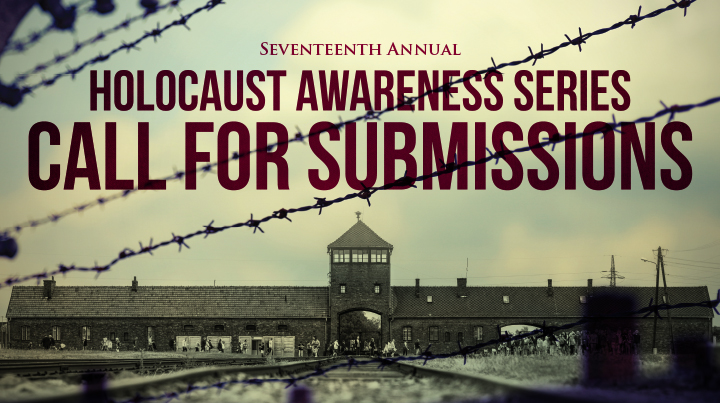Seventeenth year of event to occur on 75th year since Auschwitz liberation
CMU professors Vincent Patarino and Adam Rosenbaum announced availability for academics, authors, historians, students and organizations of all disciplines to consider contributing programing to the 2020 CMU Holocaust Awareness Series. The program will occur April 6-10, 2020 in conjunction with Holocaust Remembrance Day on April 21 and during the 75th anniversary of liberation of the Auschwitz death camp.
Previous presenters have shared thought provoking, stimulating presentations from faculty and national thought leaders from the disciplines of Anthropology, Art History, Criminal Justice, Education, English, Forensic Archeology, Political Science, Psychology, Sociology, Mass Communications, Theater and Dance, and History. The sessions have offered lectures and film presentations along with discussion of various topics related to modern patterns and questions about genocide. During the entire week of the Series, CMU will once again to include a field of flags memorial on one of the university campus lawns adjacent to the University Center. Each flag in the display will represent the different groups and people targeted during the Holocaust.
Intellectual Framework
Event planners will consider articles, presentations, lectures and films that focus on the origins, events, experiences and effects of the Jewish Holocaust. Presenters should adopt a relatively broad intellectual framework insofar as the word “Holocaust” refers to the Nazi regime’s systematic attempt to destroy the Jewish population of Europe, but the list of victims also includes Polish and Soviet civilians and soldiers, Gypsies (Roma and Sinti), Jehovah’s Witnesses, homosexuals, and various other “dissenters” and “asocials.” Additionally, given the reoccurrence of genocide before and after the Second World War, CMU organizers invite discussions and presentations on any of the government-sponsored atrocities of the modern era. This includes examples of genocide and ethnic cleansing in South West Africa, Armenia, Cambodia, Rwanda, the former Yugoslavia, Iraq, and the Sudan. Planners will also consider presentations that explore genocide more generally from a sociological or cultural point of view.
Format of Presentations
The Series is interdisciplinary in nature and therefore scholars from all disciplines and institutions are encouraged to participate and attend. Presenters should consider a wide range of possible formats including lectures with discussion, short papers with discussion, film with discussion or panel discussions. In all cases, topics should be a significant feature of the presentation since part of the goal of the series is to foster a dialogue. Sessions can occur during the daytime schedule; however, priority is provided to early evening offerings that are open to both the campus and community. Those who submit ideas should plan for a session to last about one hour to at most 90 minutes.
Contact Information
To submit a proposal send a short abstract of no more than 150 words and the title of the presentation to Vincent V. Patarino or Adam Rosenbaum in the department of Social and Behavioral Studies. Contact by e-mail: [email protected] and/or [email protected]. Deadline for submissions is Monday, March 9, 2020.


